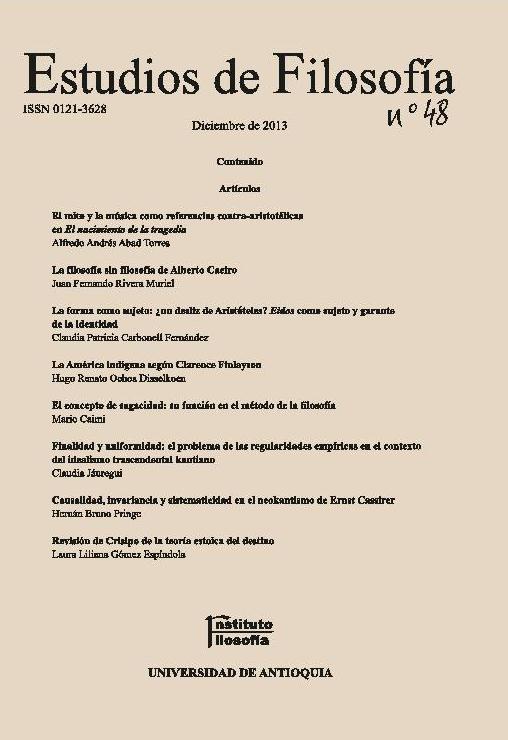Review of Chrysippus' Stoic theory or fate
DOI:
https://doi.org/10.17533/udea.ef.18354Keywords:
Fate, fatalism, determinism, Lazy Argument, co-fated events.Abstract
This paper is devoted to the Chrysippean revision of the stoic theory of fate. In order to do so, I will examine in the first place an objection directed toward this theory known as the Lazy Argument. According to this objection, if we claim that fate’s mechanism is always fatalistic, we would have to conclude that all our desires and efforts are meaningless. It will be suggested that Chrysippus developed his distinction between fated and cofated events in order to limit the fatalistic mechanism of fate to one group of events, and hence avoid this objection. Secondly, it will be shown how this proposal leads him to conceive a new theory of fate focused on the causal nexus of everything, which allows him to defend a conception of the world as a unity both in a synchronic and in a diachronic level.
Downloads
References
AFRODISIA, A. d. (1983) De Fato. En: R. W. Sharples (Ed.), Londres, Duckworth.
AFRODISIA, A. d. (1892) De mixtione. En: I. Bruns (Ed.), I. Bruns, Alexandri Aphrodisiensis praeter commentaria scripta minora. Commentaria in Aristotelem Graeca (Vol. suppl. 2.2) Berlin, Reimer.
ARNIM, H. F. A. v. (1903) Stoicorum veterum fragmenta collegit Ioannes ab Arnim. Lipsiae, aedibus B. G. Teubneri.
BOBZIEN, S. (1998a) Determinism and Freedom in Stoic Philosophy. Oxford, OUP.
BOBZIEN, S. (1998b) Chrysippus’ theory of causes. En: K. Ierodiakonou (Ed.), Topics in Stoic Philosophy. Oxford, OUP. DOI: https://doi.org/10.1093/oso/9780198237686.003.0009
BOERI, M. (2000) El determinismo estoico y los argumentos compatibilistas de Crisipo. Cuadernos del Sur- Filosofía, 29, 11-47.
BOTROS, S. (1985) Freedom, Causality, Fatalism and Early Stoic Philosophy. Phronesis, 30, 274-304. DOI: https://doi.org/10.1163/156852885X00101
CICERÓN. (1984) De natura deorum. En: Samaranch (Ed.), Sobre la naturaleza de los dioses. Madrid, Sarpe.
CICERÓN. (1991) De Fato. En R. W. Sharples (Ed.), On Fate & Boethius the consolation of philosophy. Londres, Aris & Phillips ltd.
CICERÓN. (1999) De divinatione. En: Á. Escobar (Ed.), Sobre la Adivinación. Madrid, Gredos.
CICERÓN. (2005) De Fato. En: J. Pimentel (Ed.), Del Hado. México, Bibliotheca scriptorum graecorum et romanorum mexicana.
CLEMENTE. (1960 y 1970) Stromata. En: O. S. L. Früchtel, y U. Treu (Ed.), Clemens Alexandrinus (Vol. 2 y 3). Berlin, Akademie Verlag.
EMPÍRICO, S. (1914 1961) Adversus mathematicos. En: J. M. a. H. Mutschmann (Ed.), Sexti Empirici opera (2 ed., Vol. 2 & 3). Leipzig, Teubner.
ESTOBEO. (1885) Ioannis Stobaei anthologium, 5 vols. En: O. H. y C. Wachsmuth (Ed.), Berlin, Weidmann.
EUSEBIO. (1954-1956) Preparatio evangelica. En: E. K. Mras (Ed.). Berlin, Akademie Verlag.
GALENO. (1821) Introductio sive medicus. En: C. G. Kühn (Ed.), Claudii Galeni opera omnia (Vol. 14). Leipzig, Knobloch.
GELIO. (2002) Noctes Atticae. En: A. Gaos (Ed.), Noches Áticas. México, Bibliotheca scriptorum graecorum et romanorum mexicana.
GÓMEZ ESPÍNDOLA, L. L. (2012) Primeros desarrollos de la teoría estoica del destino. Estudios de filosofía, 45, pp. 59-80. DOI: https://doi.org/10.17533/udea.ef.13477
LAERCIO, D. (1925) Vitae philosophorum. En: R. D. Hicks (Ed.), Lifes of eminent philosophers. Londres, Loeb Classical Library.
LONG, A. A., & Sedley, D. N. (1987) The Hellenistic philosophers. Cambridge [Cambridgeshire]; New York, Cambridge University Press. DOI: https://doi.org/10.1017/CBO9780511808050
MEYER, S. (2009) “Chain of Causes: What is Stoic Fate?”. En: Salles, R. (Ed.), God and Cosmos in stoicism, Oxford, OUP. DOI: https://doi.org/10.1093/acprof:oso/9780199556144.003.0004
ORÍGENES. (1967-1969) Contra Celsum. En: M. Borret (Ed.), Origène. Contre Celse. Paris, Éditions du Cerf.
PROCLO. (1873) In primum Euclidis elementorum librum commentarii. En: G. Friedlein (Ed.), Procli Diadochi in primum Euclidis elementorum librum commentarii. Leipzig, Teubner.
PSEUDOPLUTARCO. (1959) De Fato. En: J. Hendreson (Ed.), Plutarch moralia. London, The Loeb classical library. DOI: https://doi.org/10.4159/DLCL.plutarch-exile.1959
SEDLEY, D. (1993) Chrysippus on Psychophysical Causality. En: Brunschwig and Nussbaum (Ed.), Passions and Perceptions. Cambridge, The university press.
Downloads
Published
How to Cite
Issue
Section
Categories
License
Copyright (c) 2013 Laura Liliana Gómez Espíndola

This work is licensed under a Creative Commons Attribution-NonCommercial-ShareAlike 4.0 International License.
Authors who publish with this journal agree to the following terms:
1. The Author retains copyright in the Work, where the term "Work" shall include all digital objects that may result in subsequent electronic publication or distribution.
2. Upon acceptance of the Work, the author shall grant to the Publisher the right of first publication of the Work.
3. The Author shall grant to the Publisher a nonexclusive perpetual right and license to publish, archive, and make accessible the Work in whole or in part in all forms of media now or hereafter known under a Creative Commons Attribution-NoCommercia-ShareAlike (CC BY-NC-SA 4.0), or its equivalent, which, for the avoidance of doubt, allows others to copy, distribute, and transmit the Work under the following conditions: (a) Attribution: Other users must attribute the Work in the manner specified by the author as indicated on the journal Web site;(b) Noncommercial: Other users (including Publisher) may not use this Work for commercial purposes;
4. The Author is able to enter into separate, additional contractual arrangements for the nonexclusive distribution of the journal's published version of the Work (e.g., post it to an institutional repository or publish it in a book), as long as there is provided in the document an acknowledgement of its initial publication in this journal;
5. Authors are permitted, and Estudios de Filosofía promotes, to post online the preprint manuscript of the Work in institutional repositories or on their Websites prior to and during the submission process, as it can lead to productive exchanges, as well as earlier and greater citation of published work (see The Effect of Open Access). Any such posting made before acceptance and publication of the Work is expected be updated upon publication to include a reference to the Estudios de Filosofía's assigned URL to the Article and its final published version in Estudios de Filosofía.















